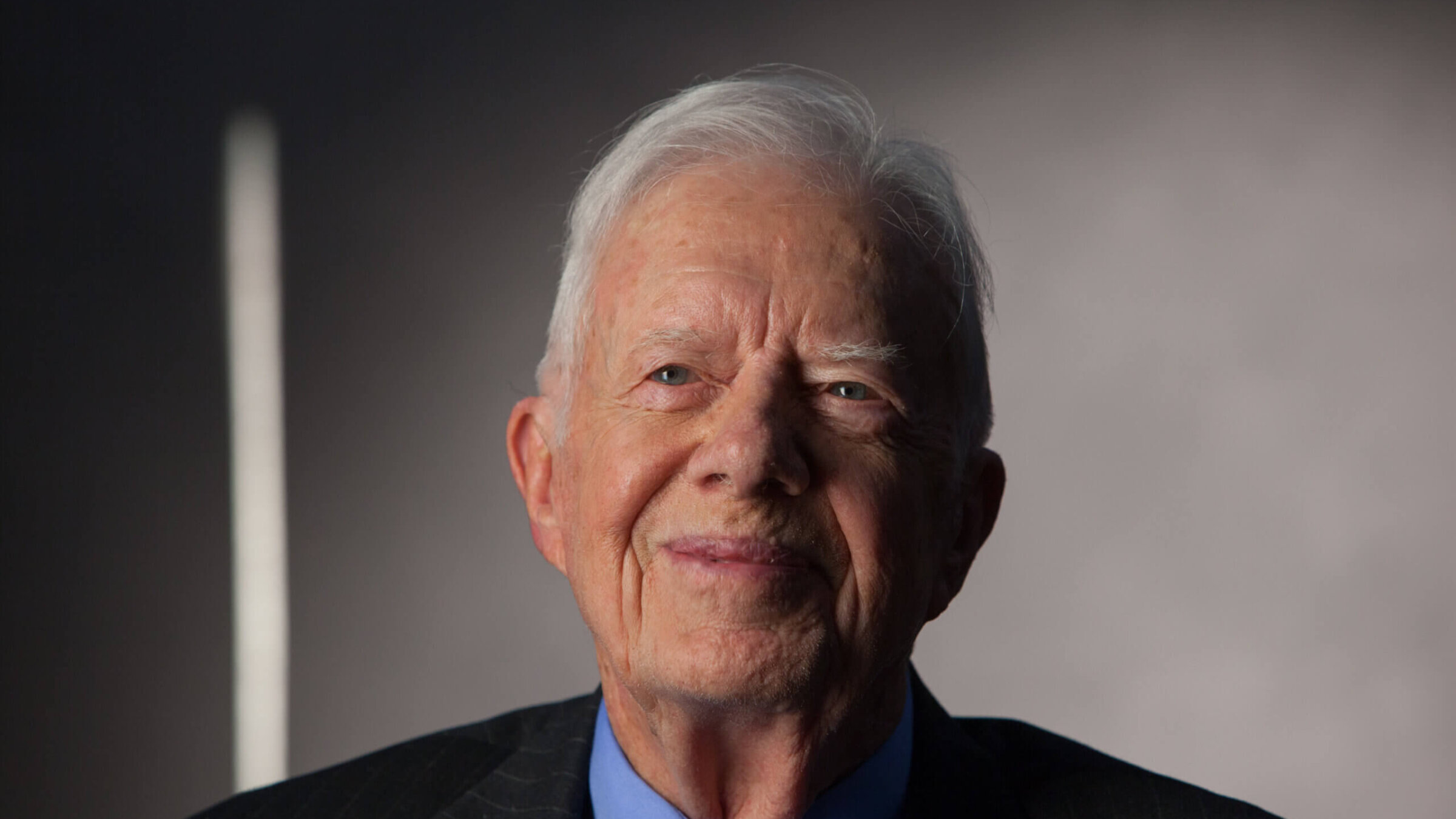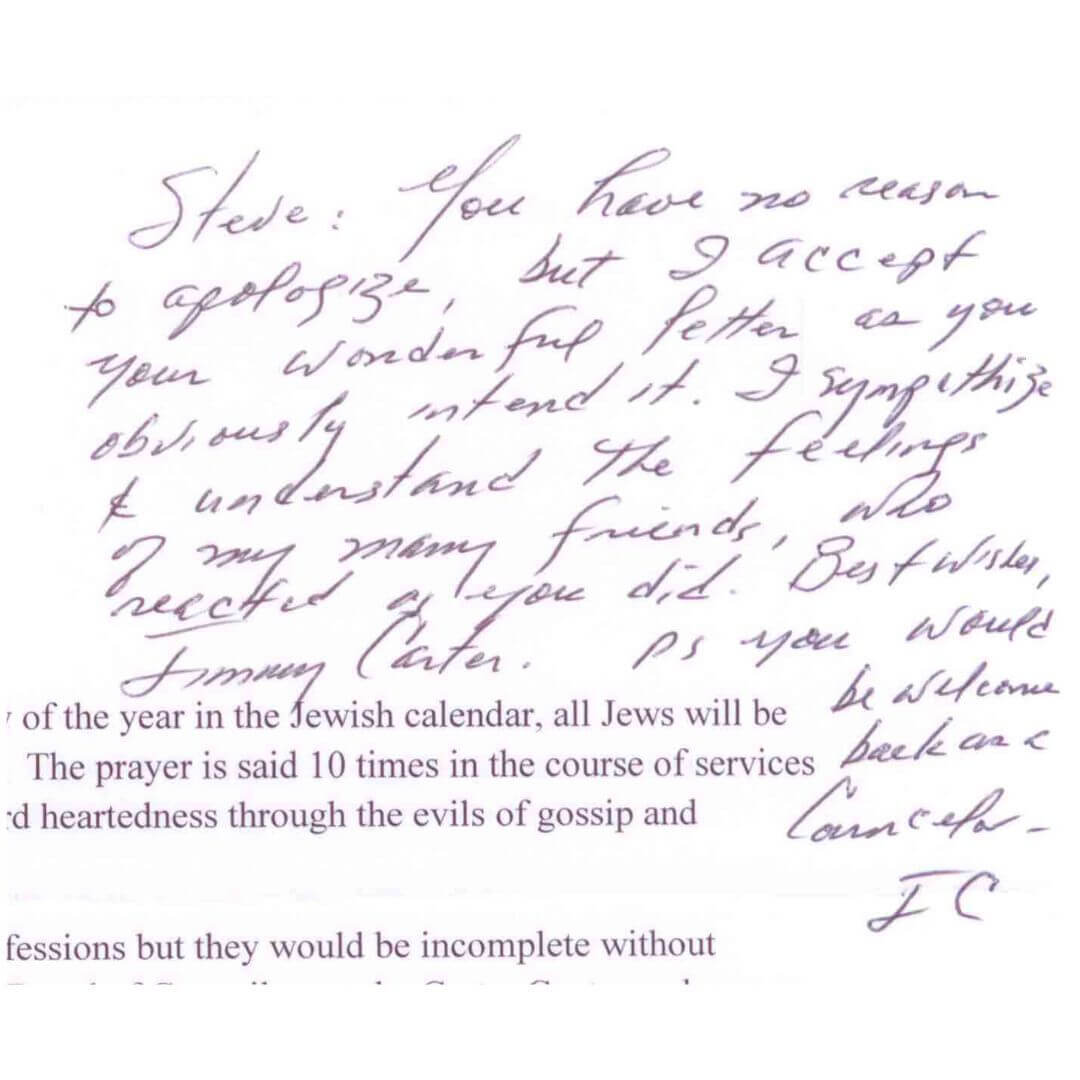Former President Jimmy Carter interviewed for “The Presidents’ Gatekeepers” project at the Carter Center, Atlanta, Georgia, Sept. 14, 2011. Photo by David Hume Kennerly/Getty Images
 Steve Berman March 10, 2023
Steve Berman March 10, 2023
In the fall of 2015, with the leaves in Atlanta fading to a warm golden glow, I started doing my annual inventory of who I needed to apologize to. It was nearly Rosh Hashanah, and somehow, my attention drifted to President Carter.
Ten years prior, the Carter Center reached out to me to join their Board of Councilors. I was deeply moved by the work President Carter was doing for public health in Africa and nurturing nascent democracies.
Then in 2006, Carter published his now-famous book Palestine: Peace not Apartheid. I was troubled by the title, and by numerous passages that were very uncomfortable and disturbing to read. While I was increasingly frustrated by Israel’s occupation of the West Bank, I was angry that the president had roiled the diplomatic waters with his controversial book.
I led 15 members of the Board of Councilors to resign. I was not happy about this public break from the president, but I felt that even my left-of-center sensibilities had been betrayed. I listened to his explanations: He wasn’t calling Israel an apartheid state, he said, but warning that Israel was moving toward this state of affairs by its ongoing occupation of the West Bank. At the time, I wasn’t convinced.
But in the intervening years, I realized that he was likely right.
And so, I penned a letter to him. It spoke of the High Holidays, and my own personal admissions. I wrote about how the shofar was sounded as a means of awakening our spirits. I wrote that, as of late, I had started to view Israel’s occupation of the Palestinians as something that started in 1967 as an accident but was now becoming an enterprise with colonial intentions.
I sent my letter to Carter with no expectations. I was surprised when, a week later, I received a note from the president in reply.
Former President Jimmy Carter’s handwritten response to the author’s letter. It reads: “Steve: You have no reason to apologize, but I accept your wonderful letter as you obviously intend it. I sympathize & understand the feelings of my many friends, who reacted as you did. Best wishes, Jimmy Carter. P.S. You would be welcome back at the Carter Center. JC.” Courtesy of Steve Berman
I shared the exchange with my family and a few friends, and filed the letter away, where it sat for the past eight years. When the president’s family announced that the president had entered hospice care, I felt a sadness that accompanies such news.
Before it is too late, American Jews should apologize to Jimmy Carter, and thank him for everything he has done for us and the world.
Deep ties to Israel
My relationship with Israel started in 1965, when I was 10 years old. My parents took our family of three young boys to Haifa to spend the year while my father took a sabbatical leave. That year led to summers on a kibbutz, university year programs, and eventually two more years in the country with my wife.
All of our children created similar relationships with Israel. One daughter lived there for over 15 years and gave birth to three of our grandchildren there. My family is wound up very tightly in the Zionist dream of Jewish redemption.
I have seen rockets fall on my grandchildren’s city of Tel Aviv, and I was living in Jerusalem in 1973 when the Yom Kippur War took place. I have lost friends in terror attacks. In the last 57 years, I have experienced the entire range of emotions when the image of Israel is conjured: fear, anger, bereavement, frustration, sadness, exhilaration, connectedness and alienation.
I watched Israel closely after my resignation from the board of the Carter Center. During that period, I traveled to the country at least 20 times. I came to realize that the Jewish state was indeed burying its head in the sand. Israel was not facing the demographic realities, and was fast becoming a state that could not be both democratic and Jewish.
During this time, as the start-up nation revved its engines, the Israeli left seemed more consumed by espressos and stock options than with peace. The Israeli right would disingenuously speak about Abraham Accords and “peace deals” with nations thousands of miles away instead of any meaningful attempts to address the occupation taking place in its own backyard.
The reasonable Israelis would demur, “It’s complicated.” The right-wing Israelis would proclaim, “there is nobody to talk to.” And the left would say, “Waiter, another espresso please!”
In the meantime, I kept thinking about Carter’s prediction that apartheid was in Israel’s future if leadership kept ignoring the general direction of the country.
Our last chance for teshuvah
Peter Beinart wrote recently that “Jimmy Carter Deserves an Apology Before He Dies.” As I read it, I thought of the millions of lives the president affected through his successful battle to eradicate two diseases on the African continent, his tireless promotion of Habitat For Humanity and his campaign to support the growth of democracy.
Perhaps Carter’s most important achievement was the Camp David Peace Accord between Israel and Egypt. This peace treaty has endured for 44 years, and spared thousands of lives on the Israeli-Egyptian border. It also saved hundreds of billions of dollars in military costs that the two countries would have needlessly spent.
President Carter warned everyone in 2006 that we all had the choice of Peace Not Apartheid. Some have made deliberate choices on the matter of Israeli occupation; some have walked in a stupor, blaming the other for their shortcomings. Others still blame the messenger for the message.
In his response to my apology, Carter wrote a simple and touching message:
“You have no reason to apologize, but I accept your wonderful letter as you obviously intend it. I sympathize and understand the feelings of my many friends, who reacted as you did. Best wishes, Jimmy Carter.”
I was shaken and inspired by his humility. Carter owed me nothing, yet gave me a sense there is a capacity within us all for unconditional love.
To contact the author, email opinion@forward.com.
<<<<<<<<<<>>>>>>>>>>>
Palestine: Peace Not Apartheid
https://en.wikipedia.org/wiki/Palestine:_Peace_Not_Apartheid
A book written by 39th President of the United States Jimmy Carter. It was published by Simon & Schuster in November 2006.
During his presidency, Carter hosted talks between Menachem Begin of Israel and Anwar Sadat of Egypt that led to the Egypt–Israel peace treaty.
In this book Carter argues that Israel's continued control and construction of settlements have been the primary obstacles to a comprehensive peace agreement in the Middle East.[3] That perspective, coupled with the use of the word Apartheid in the titular phrase Peace Not Apartheid, and what critics said were errors and misstatements in the book, sparked controversy. Carter has defended his book and countered that response to it "in the real world…has been overwhelmingly positive."[4]
The documentary Man from Plains (2007) depicts the book tour Carter undertook to promote his book.
Purpose, main argument, and major points
"The ultimate purpose"
The ultimate purpose of my book is to present facts about the Middle East that are largely unknown in America, to precipitate discussion and to help restart peace talks (now absent for six years) that can lead to permanent peace for Israel and its neighbors. Another hope is that Jews and other Americans who share this same goal might be motivated to express their views, even publicly, and perhaps in concert. I would be glad to help with that effort.[4]
Thesis: How to achieve "permanent peace in the Middle East"
Carter identifies "two interrelated obstacles to permanent peace in the Middle East":
[1] Some Israelis believe they have the right to confiscate and colonize Palestinian land and try to justify the sustained subjugation and persecution of increasingly hopeless and aggravated Palestinians; and
[2] Some Palestinians react by honoring suicide bombers as martyrs to be rewarded in heaven and consider the killing of Israelis as victories.[3]
To bring an end to what he calls "this continuing tragedy", in Chapter 17 ("Summary"), Carter calls for a revitalization of the peace process based on the following three "key requirements":
a. The security of Israel must be guaranteed ...
b. The internal debate within Israel must be resolved in order to define Israel's permanent legal boundary ...
c. The sovereignty of all Middle East nations and sanctity of international borders must be honored ...[3]
The Apartheid analogy
Regarding the use of the word "Apartheid" in the title of his book, Carter has said:
It's not Israel. The book has nothing to do with what's going on inside Israel which is a wonderful democracy, you know, where everyone has guaranteed equal rights and where, under the law, Arabs and Jews who are Israelis have the same privileges about Israel. That's been most of the controversy because people assume it's about Israel. It's not.[5]
I've never alleged that the framework of apartheid existed within Israel at all, and that what does exist in the West Bank is based on trying to take Palestinian land and not on racism. So it was a very clear distinction.[6]
In remarks broadcast over radio, Carter claimed that Israel's policies amounted to an apartheid worse than South Africa's:[7]
When Israel does occupy this territory deep within the West Bank, and connects the 200-or-so settlements with each other, with a road, and then prohibits the Palestinians from using that road, or in many cases even crossing the road, this perpetrates even worse instances of apartness, or apartheid, than we witnessed even in South Africa.[7]
"Some major points"
In his op-ed "Reiterating the Keys to Peace", published in The Boston Globe on 20 December 2006, Carter summarizes "[s]ome major points in the book":
Multiple deaths of innocent civilians have occurred on both sides, and this violence and all terrorism must cease
For 39 years, Israel has occupied Palestinian land, and has confiscated and colonized hundreds of choice sites
Often excluded from their former homes, land, and places of worship, protesting Palestinians have been severely dominated and oppressed. There is forced segregation between Israeli settlers and Palestine's citizens, with a complex pass system required for Arabs to traverse Israel's multiple checkpoints
An enormous wall snakes through populated areas of what is left of the West Bank, constructed on wide swaths of bulldozed trees and property of Arab families, obviously designed to acquire more territory and to protect the Israeli colonies already built. (Hamas declared a unilateral cease-fire in August 2004 as its candidates sought local and then national offices, which they claim is the reason for reductions in casualties to Israeli citizens.)
Combined with this wall, Israeli control of the Jordan River Valley will completely enclose Palestinians in their shrunken and divided territory. Gaza is surrounded by a similar barrier with only two openings, still controlled by Israel. The crowded citizens have no free access to the outside world by air, sea, or land
The Palestinian people are now being deprived of the necessities of life by economic restrictions imposed on them by Israel and the United States because 42 percent voted for Hamas candidates in this year's election. Teachers, nurses, policemen, firemen and other employees cannot be paid, and the UN has reported food supplies in Gaza equivalent to those among the poorest families in sub-Sahara Africa, with half the families surviving on one meal a day
Mahmoud Abbas, first as prime minister and now as president of the Palestinian National Authority and leader of the PLO, has sought to negotiate with Israel for almost six years, without success. Hamas leaders support such negotiations, promising to accept the results if approved by a Palestinian referendum
UN Resolutions, the Camp David Accords of 1978, the Oslo Agreement of 1993, official US Policy, and the International Roadmap for Peace are all based on the premise that Israel withdraw from occupied territories. Also, Palestinians must accept the same commitment made by the 23 Arab nations in 2002: to recognize Israel's right to live in peace within its legal borders. These are the two keys to peace[8]
Critical reaction and commentary
Main article: Commentary on Palestine: Peace Not Apartheid
Critical response to Palestine: Peace Not Apartheid at the time of release was mixed. According to Julie Bosman, criticism of the book "has escalated to a full-scale furor," much of which has focused on Carter's use of the word "apartheid" in the subtitle.[9] Some critics, including several leaders of the Democratic Party and of American Jewish organizations, have interpreted the subtitle as an allegation of Israeli apartheid, which they believe to be inflammatory and unsubstantiated.[10][11][12] Tony Karon, Senior Editor at TIME.com and a former anti-Apartheid activist for the ANC, said: "Jimmy Carter had to write this book precisely because Palestinian life and history is not accorded equal value in American discourse, far from it. And his use of the word apartheid is not only morally valid; it is essential, because it shakes the moral stupor that allows many liberals to rationalize away the daily, grinding horror being inflicted on Palestinians in the West Bank and Gaza".[13] Former President Bill Clinton wrote a brief letter to the chairman of the American Jewish Committee, thanking him for articles criticizing the book and citing his agreement with Dennis Ross's attempts to "straighten ... out" Carter's claims and conclusions about Clinton's own summer 2000 Camp David peace proposal.[14][15]
Critics claim that Carter crossed the line into anti-Semitism. Abraham Foxman, the national director of the Anti-Defamation League, initially accused Carter of "engaging in anti-Semitism" in the book; Foxman told James Traub later that he would not call the former president himself an "anti-Semite" or a "bigot".[16][17] Ethan Bronner also asserted that Carter's "overstatement" in the book "hardly adds up to anti-Semitism."[18]
Some journalists and academics have praised Carter for what they believe to be speaking honestly about the Israeli–Palestinian conflict in a media environment described as hostile to opponents of Israel's policies.[19][20] Some left-leaning Israeli politicians such as Yossi Beilin and Shulamit Aloni argued that Carter's critique of Israeli policy in the Palestinian territories reflects that of many Israelis themselves.[21]
Carter's response to criticism of the book
Further information: Commentary on Palestine: Peace Not Apartheid § Carter's response to criticism of the book
Carter has responded to negative reviews in the mainstream news media in an op-ed published in the Los Angeles Times (which was excerpted in The Guardian and elsewhere):
Book reviews in the mainstream media have been written mostly by representatives of Jewish organizations who would be unlikely to visit the occupied territories, and their primary criticism is that the book is anti-Israel. Two members of Congress have been publicly critical. Incoming Speaker Nancy Pelosi for instance, issued a statement (before the book was published) saying that "he does not speak for the Democratic Party on Israel." Some reviews posted on Amazon.com call me "anti-Semitic", and others accuse the book of "lies" and "distortions". A former Carter Center fellow has taken issue with it, and Alan Dershowitz called the book's title "indecent."
Out in the real world, however, the response has been overwhelmingly positive. I've signed books in five stores, with more than 1,000 buyers at each site. I've had one negative remark—that I should be tried for treason—and one caller on C-SPAN said that I was an anti-Semite. My most troubling experience has been the rejection of my offers to speak, for free, about the book on university campuses with high Jewish enrollment and to answer questions from students and professors. I have been most encouraged by prominent Jewish citizens and members of Congress who have thanked me privately for presenting the facts and some new ideas.[4][22]
He also wrote a "Letter to Jewish Citizens of America" explaining "his use of the term 'apartheid' and sympathizing with Israelis who fear terrorism."[23]
In a report updated by the Associated Press after the publication of Carter's "Letter to Jewish Citizens of America", Greg Bluestein observes that Carter replied generally to complaints of the book's errors and inaccuracies by Dennis Ross, Alan Dershowitz, Kenneth Stein, the Simon Wiesenthal Center, and others by pointing out that the Carter Center staff as well as an "unnamed 'distinguished' reporter" fact-checked it.[23][24] Rachel Zelkowitz points out that, as cited in various news accounts, "Carter has consistently defended his book's accuracy against Stein and other critics"; in a prepared statement, Carter's press secretary Deanna Congileo responds "that Carter had his book reviewed for accuracy throughout the writing process" and that "[a]s with all of President Carter's previous books, any detected errors will be corrected in later editions ..."[25] In response to the Associated Press's request for a comment on the resignations of Stein and 14 other members of the Center's Board of Councilors, speaking on behalf of both Carter and the Carter Center, Congileo provided a statement from its executive director, John Hardman, who, according to Zelkowitz, "also fact checked Palestine, saying that the members of that board 'are not engaged in implementing the work of the Center.'"[26]






